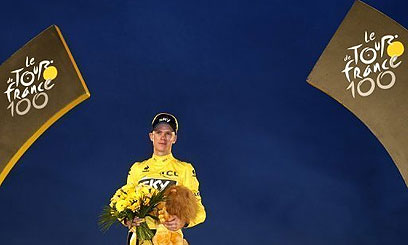
 NAIROBI, Kenya, July 22- When he speaks about Chris Froome, it is evident this is not a man out to gatecrash on the glory of the Kenyan born British rider who now stands on top of the world’s cycling tree following his Tour De France victory.
NAIROBI, Kenya, July 22- When he speaks about Chris Froome, it is evident this is not a man out to gatecrash on the glory of the Kenyan born British rider who now stands on top of the world’s cycling tree following his Tour De France victory.
David Kinjah voice trails sometimes into a shadow of gloom when he knows the glory being painted across Britain would easily been Kenya’s had the country’s administrators offered the budding rider who switched nationality in 2008 more support.
As he sat down to one of the countless interviews he has been through since it became apparent that his protégée was pedalling his way to the Tour de France Yellow Jersey on Monday, Kinjah told of how Froome was discouraged out of Kenyan citizenship by Kenya Cycling Federation (KCF) officials.
“His last assignment for Kenya was in 2007 when he won the silver medal at the All Africa Games in Algiers. There was already a lot of frustration and a lot of politics in the federation.
“All his friends in the Kenya team, including myself and other top riders had been disqualified from the selection event and we could not support Chris and it was frustrating for him,” Kinjah, who was spotting the riding shoes Froome competed at last years Tour de France where he finished second to Bradley Wiggins said.
“He was a sharp guy, he always wanted to look out for chances and in 2007, he joined a big team in South Africa and decided he did want to participate in the politics, he wanted to go ahead and realise his dreams and goals,” Kinjah added.
“In 2008, he changed his citizenship to Britain. His mother passed away and the little bit of hope left for him disappeared. Politics are there, its part of life but here in Kenya, the cycling federation has outlived its time.
“I don’t believe they understand very well what happens in the cycling world and even though they are a few of them who are willing but when you put little issues and make them big politics, you lose friends with the riders,” he explained further.
“For Chris, it was most important that what he has built with a lot of challenges does not disappear and the British were already knocking on the door. They had already seen the problems, frustrations and mismanagement here and they showed Chris his future is not here.
“It was up to Chris to make up his mind and they asked him do you want to stay a Kenyan and lose it all or do you want to go ahead and get support? He chose the B option and to me, he made a good choice, he had nothing to lose.
“Even after that, we stayed in contact and he visits Kenyan often and even now that he is on top of the world and he still embraces Kenya and that is huge respect,” the mentor disclosed.
While the case of Froome is not unique in a country where sporting administrators are often at a loss on how to deal with latent talent, Kinjah, the country’s foremost indigenous rider is calling for a chance in management of budding sports personalities.
“The sports authorities should respect their athletes, it doesn’t matter what sport it is. Champions are not necessarily born, they don’t just happen, there is a lot of hard work, persistence, patience and love and if that is missing out, sports will remain politics.”
“Winning the Tour de France is beyond what words can say. Growing up, I could only idolise and look at then magazines and stories on TV and imagine myself, a Kenyan or just meeting the Tour greats.
“Seeing it now it is somebody we know, somebody we nurtured when he was young and he is like my brother is unbelievable that what I used to dream as a young rider, the Yellow Jersey is in our hands, it’s amazing.”
Kinjah wishes that Froome can have time away from the bicycles and the press with his fiancée after his epic victory although he admits that will be a tad bit impossible after his achievement.